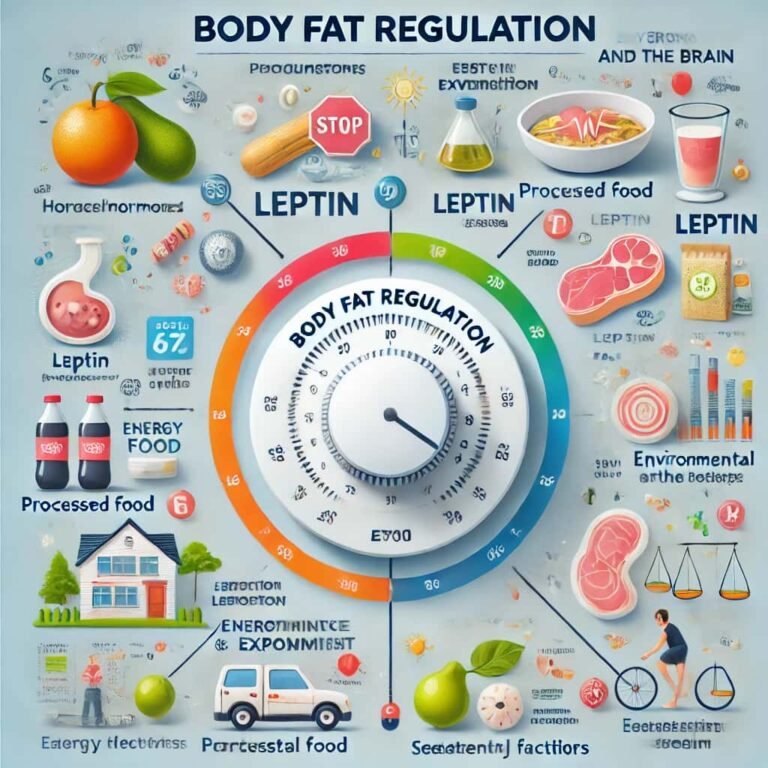

Our body has an incredibly sophisticated system that regulates body fat, almost like a biological “thermostat.” In this blog, we’ll explore how this system works, the role of hormones like leptin, and strategies to better manage weight, based on scientific findings.
What Does “Body Fat Regulation” Really Mean?
Imagine a thermostat that adjusts a room’s temperature: if it gets too hot, it cools down; if it gets too cold, it heats up. Your body works similarly when it comes to body fat. Even if you eat more one day or less the next, your body compensates for these changes by adjusting appetite or energy expenditure to maintain balance.
This system, known as the physiological regulation of fat mass, aims to ensure we have enough fat to meet basic energy and survival needs. But, like a faulty thermostat, this system can make life difficult—especially in a world filled with ultra-processed foods and sedentary habits.
Leptin: The Hormonal Messenger That Connects Fat to the Brain
At the center of this system is leptin, a hormone produced by fat cells. Think of it as the “voice of fat,” because its main job is to inform the brain about the body’s fat stores.
When your fat stores are high, leptin levels increase and signal the brain to reduce appetite. When you lose weight, leptin levels drop, prompting the brain to trigger hunger and conserve energy—like the body trying to “save fuel” for survival.
However, this mechanism has a flaw: in people with obesity, the brain often stops responding to leptin, a condition called leptin resistance. It’s as if this hormonal “voice” gets drowned out, and the body continues accumulating fat without realizing it already has enough.
The Challenge of Losing Weight: Why Is It So Difficult?
Here’s the dilemma: when you lose weight, your body doesn’t see it as an achievement but as a threat. Imagine trying to empty a water tank while the system keeps refilling it.
As leptin levels drop due to fat loss, the body reacts by increasing hunger and reducing energy expenditure. For example, people who lose weight may experience a slower metabolism than expected, meaning they need to eat less to maintain their weight compared to someone who has never had to diet.
Hunger signals also intensify. Research shows that after losing 10% of their body weight, people reported feeling hungrier and craving high-calorie foods even a year after dieting.
How Can We Work With This System Instead of Fighting It?
Although this biological mechanism seems designed to make life harder, all is not lost. The key lies in strategies that “train” this system or minimize its negative impact:
Gradual and Sustainable Changes:
Instead of extreme diets, adopt small lifestyle changes, like slightly reducing portion sizes or incorporating daily walks. Activities like taking the stairs, biking to regular destinations, or even short stretches of physical movement can help. These gradual changes are less likely to trigger drastic compensatory responses from the body.
Foods That Regulate Appetite:
Eating fiber-rich, protein-packed, and water-dense foods, such as fruits, vegetables, and legumes, can help you feel full for longer, reducing the urge to overeat.
Personalized Medical Attention:
For those facing significant challenges with weight, medical and pharmacological treatments can help. Certain medications mimic leptin’s actions or increase levels of hormones like GLP-1, which promotes satiety. These treatments must be paired with sustainable lifestyle changes to prevent dependency. The goal is to transition from medication to a healthier lifestyle over time.
The Role of Environment: An Added Obstacle
While our bodies are designed to defend a fat level, the modern world doesn’t make it easy. Ultra-processed foods, oversized portions, and sedentary jobs complicate the balance.
Although genetic differences make some people more prone to gaining weight, most of us are affected by this obesogenic environment. Cultivating a critical mindset about what we consume and dedicating time to movement can help counteract these tendencies.
Is There Hope? Yes, It’s Called Education and Support
Understanding that weight isn’t entirely under voluntary control can change how we approach this challenge. It’s not about willpower but about working with what science teaches us about our bodies.
Practical Tips to Start Today:
- Eat slowly: This gives your body time to process satiety signals.
- Stay active: Even short walks can make a difference in energy expenditure.
- Get enough sleep: Sleep deprivation increases hunger hormones like ghrelin and decreases satiety hormones like leptin.
- Seek professional support: Nutritionists, dietitians, doctors, and psychologists can provide personalized tools for your needs.
Let’s Begin the Change
The human body is a marvel of nature, designed for survival in conditions that no longer match our reality. The key is understanding its mechanisms and working in harmony with them to achieve and maintain a healthy weight.
Every small change counts. Why not start today with a simple decision, like choosing a healthier snack or taking a short walk? Sometimes, the smallest steps lead to the greatest distances.
Reference: Sumithran P. The physiological regulation of body fat mass. Gastroenterol Clin North Am. 2023;52(2):295–310. doi:10.1016/j.gtc.2023.03.003.
